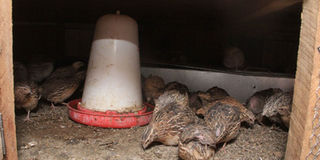Get-rich-quick projects fail to live up to their billing hurting small investors

Quails feeding in their cage in Nyeri town on January 18, 2014. T PHOTO | JOSEPH KANYI
What you need to know:
- Financial analyst Esther Wanyonyi says many small-scale investors have been joining trendy get-rich-quick deals without an objective study of the target market.
- Financial adviser Esther Wanyonyi says it would have been wise for these farmers to sit back and assess whether their projects had room for growth, and most importantly — a sustainable market.
In August last year, Sylvester Wafula started quail business. He bought 20 quails and by Monday last week, he had over 600. “I’ve spent at least Sh200,000 on quails. I wanted to be on the selling side when business booms.”
His venture, however, has not recorded impressive returns: “When I started, the price of eggs was over Sh80 and a mature quail attracted between Sh350 and Sh500. Today, an egg fetches Sh10 while quail is going for as little as Sh180,” he says, betraying a tinge of frustration.
The market is saturated. “Everybody seems to be rearing, selling or hatching quails. No one seems to be buying. I’m stuck with hundreds of quails. If I sell them under the current price, I’ll suffer Sh126,000 loss; if I keep them their maintenance costs keep soaring,” he says.
Even as Mr Wafula feels the heat, other farmers are preparing to dip their fingers into the boiling quail business water. Kenya Wildlife Service (KWS) says it receives about 200 applications for quail rearing permits daily. “We’re overwhelmed. Our offices look like jammed conference halls,” says KWS licensing officer Lucy Muita. An annual licence costs Sh1,500.
Alarmingly, Money has established that the market glut in quail business has been replicated in other popular farming projects in Kenya. Financial analyst Esther Wanyonyi says many small-scale investors have been joining trendy get-rich-quick deals without an objective study of the target market.
“Farmers are flooding the market with large supplies than the available demand and or consumer purchasing power. This, inevitably, is saturating the market, making stock impossible to move,” she observes.
Financial adviser Esther Wanyonyi says it would have been wise for these farmers to sit back and assess whether their projects had room for growth, and most importantly — a sustainable market. “Successful business ideas do not rely on a one-off target; they require critical evaluation of their market segment,” she says.
“If you must join, establish a unique detail that everyone else in the same project has not spotted,” she says. This is what Tony Kihara, a former banker and lecturer at Inoorero University is doing.
Mr Kihara believes that it is not too late to invest in quails.




